CTU Leaders Snub House of Delegates (again)... Charter school organizing event pre-emps House of Delegates
[Editor's note: The following report was from notes taken during the April 15, 2009 meeting of the Chicago Teachers Union's 900-member House of Delegates. The notes were taken on the spot and in some cases, the conditions of the meeting made it impossible for the reporter to hear the name or school of a speaker. Substance will be publishing these reports regularly, fir on line and then in print, as soon as we can edit them following the meeting. During the meeting, Substance editor George Schmidt told CTU Financial Secretary Mark Ochoa that the union should update and improve its Website, and that one way to do so would be to video and publish on-line a complete video report of every House of Delegates meeting.]
Chicago Teachers Union House of Delegates Shortened (Again)
By Jen Johnson
The Chicago Teachers Union House of Delegates met for the first time in two months at Chicago's Plumbers Hall (1340 W. Washington St.) on April 15, 2009. Once again, the meeting was what many are now calling "Non Meetings." The CTU House of Delegates had been meeting monthly for more than 30 years, according to veteran delegates. Not any longer. 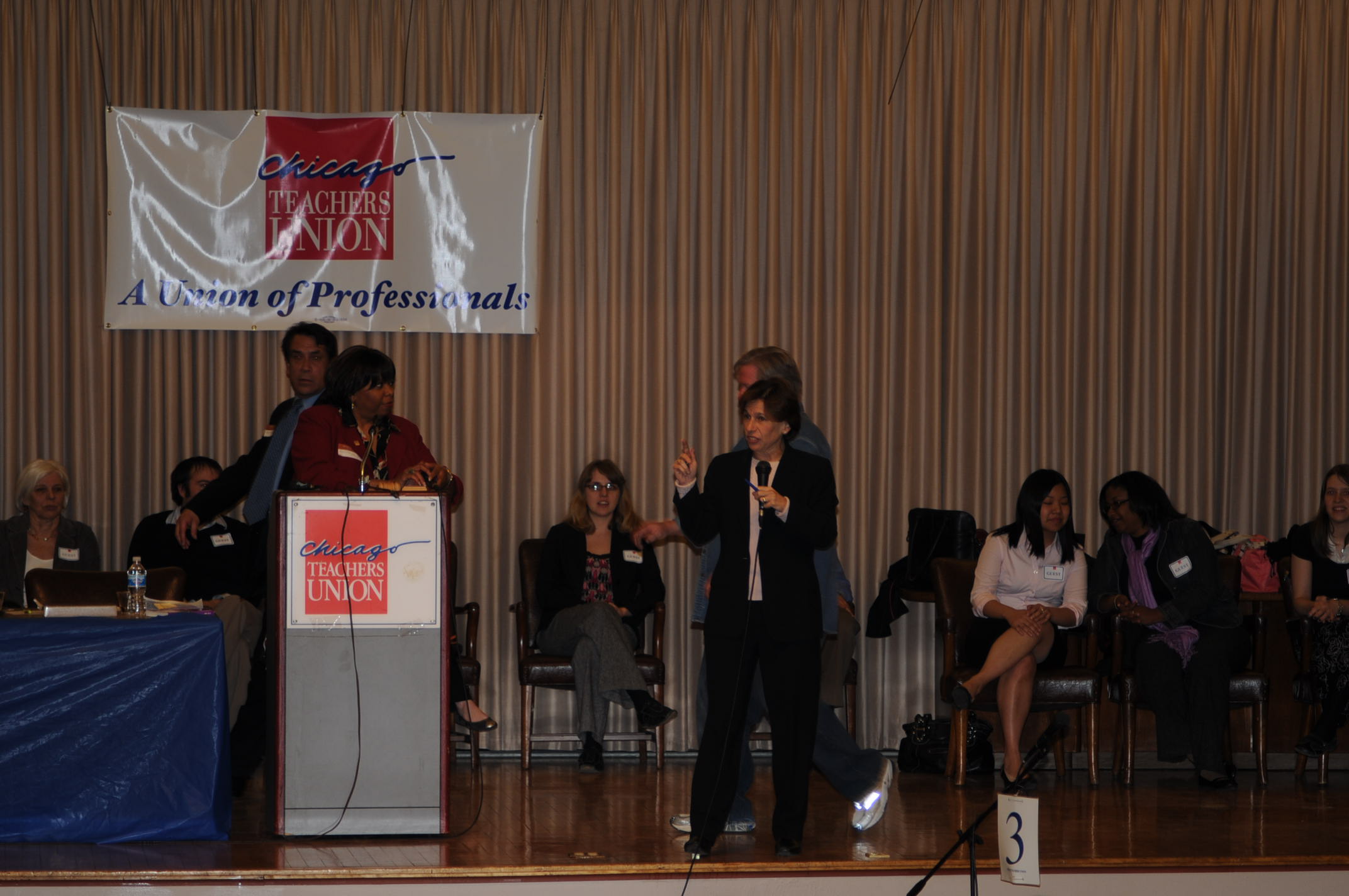 American Federation of Teachers (AFT) President Randi Weingarten (above center, holding microphone) gave a lengthy speech to the April 15, 2009 meeting of the Chicago Teachers Union House of Delegates about the need to organize charter schools and not oppose the expansion of charter schools. Weingarten also told of her support for the Obama administration, despite the reservations of most Chicago teachers about the appointment of former Chicago schools "Chief Executive Officer" (CEO) Arne Duncan as U.S. Secretary of Education by President Obama. At the podium to Ms Weingarten's right (above) is CTU President Marilyn Stewart, who once again (for the third time since September 2008) stopped the House of Delegates from meeting to discuss union business, this time on the pretext that April 15 was the only day Weingarten could be in Chicago. Substance photo by George N. Schmidt. For a year, delegates have been noting that the current leadership of the Chicago Teachers Union, under President Marilyn Stewart, has been trying to avoid delegates' meetings. The leadership either cancels meetings outright (October 2008), cancels them in favor of some other activity (March 2009), or has its supports adjourning meetings as quickly as possible when delegates ask questions or raise important issues (April 2009 and most other recent meetings).
American Federation of Teachers (AFT) President Randi Weingarten (above center, holding microphone) gave a lengthy speech to the April 15, 2009 meeting of the Chicago Teachers Union House of Delegates about the need to organize charter schools and not oppose the expansion of charter schools. Weingarten also told of her support for the Obama administration, despite the reservations of most Chicago teachers about the appointment of former Chicago schools "Chief Executive Officer" (CEO) Arne Duncan as U.S. Secretary of Education by President Obama. At the podium to Ms Weingarten's right (above) is CTU President Marilyn Stewart, who once again (for the third time since September 2008) stopped the House of Delegates from meeting to discuss union business, this time on the pretext that April 15 was the only day Weingarten could be in Chicago. Substance photo by George N. Schmidt. For a year, delegates have been noting that the current leadership of the Chicago Teachers Union, under President Marilyn Stewart, has been trying to avoid delegates' meetings. The leadership either cancels meetings outright (October 2008), cancels them in favor of some other activity (March 2009), or has its supports adjourning meetings as quickly as possible when delegates ask questions or raise important issues (April 2009 and most other recent meetings).
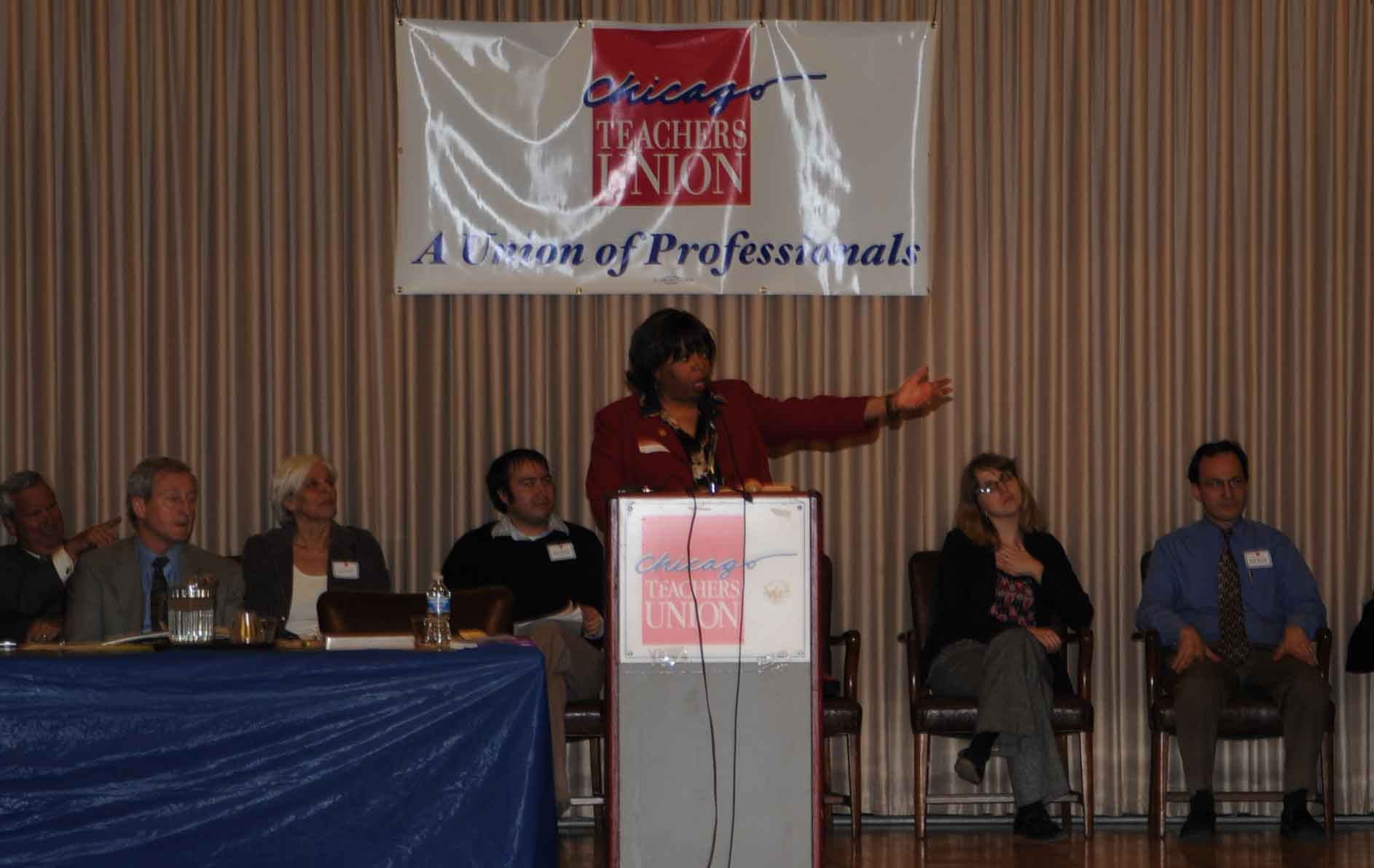 Chicago Teachers Union President Marilyn Stewart (above at podium, gesturing) basically eliminated the business meeting of the union for the third time in seven months by pre-empting the meeting for a media event touting the union's organization of three Chicago charter schools (out of nearly 100). Stewart and others during the event talked at length about the importance of organizing charter school teachers as opposed to opposing the expansion of charter schools. Neither Stewart nor any of the other speakers noted that under current Illinois law ("The Amendatory Act of 1995"), charter school teachers are not allowed to join the Chicago Teachers Union. Instead, as was noted during the April 15 meeting, the charter staffs have to organize into separate locals of the Illinois Federation of Teachers (IFT), each of which then has to bargain their own small contracts with the charter management organizations. Stewart has opposed legislation to repeal the Amendatory Act since she became CTU President in August 2004. The Amendatory Act, first passed by the Illinois General Assembly in 1995, gave Chicago Mayor Richard M. Daley the power to appoint a "Chief Executive Officer" for Chicago's schools, deregulated many school functions (including the requirement that the chief of the schools be a certified school administrator with an Illinois Type 75 certificate), mandated massive privatization, and stripped the CTU of its right to bargain over key items such as class size. Finally, the law forced the charter school teachers to form separate small unions, instead of having the choice of organizing into the massive Chicago Teachers Union and immediately getting the benefits of the CTU contract. Substance photo by George N. Schmidt. The meeting on April 15, 2009, was no different. Instead of a regular meeting to hear about and discuss union business, the union's leadership had announced, at the last minute, that the meeting would begin with a major media event. The media event featured leaders of a dozen unions — including American Federation of Teachers President Randi Weingarten — to celebrate the organization of three Chicago charter school "campuses" into a local of the Illinois Federation of Teachers (IFT). The teachers who had organized the new charter school union local and community leaders would also be present. Delegates arriving at the large auditorium on the second floor of Plumbers Hall knew that something was different, even if they hadn't been told about the media event. A dozen rows of seats had been removed at the back of the auditorium so that a raised platform for TV cameras and other media could be set up.
Chicago Teachers Union President Marilyn Stewart (above at podium, gesturing) basically eliminated the business meeting of the union for the third time in seven months by pre-empting the meeting for a media event touting the union's organization of three Chicago charter schools (out of nearly 100). Stewart and others during the event talked at length about the importance of organizing charter school teachers as opposed to opposing the expansion of charter schools. Neither Stewart nor any of the other speakers noted that under current Illinois law ("The Amendatory Act of 1995"), charter school teachers are not allowed to join the Chicago Teachers Union. Instead, as was noted during the April 15 meeting, the charter staffs have to organize into separate locals of the Illinois Federation of Teachers (IFT), each of which then has to bargain their own small contracts with the charter management organizations. Stewart has opposed legislation to repeal the Amendatory Act since she became CTU President in August 2004. The Amendatory Act, first passed by the Illinois General Assembly in 1995, gave Chicago Mayor Richard M. Daley the power to appoint a "Chief Executive Officer" for Chicago's schools, deregulated many school functions (including the requirement that the chief of the schools be a certified school administrator with an Illinois Type 75 certificate), mandated massive privatization, and stripped the CTU of its right to bargain over key items such as class size. Finally, the law forced the charter school teachers to form separate small unions, instead of having the choice of organizing into the massive Chicago Teachers Union and immediately getting the benefits of the CTU contract. Substance photo by George N. Schmidt. The meeting on April 15, 2009, was no different. Instead of a regular meeting to hear about and discuss union business, the union's leadership had announced, at the last minute, that the meeting would begin with a major media event. The media event featured leaders of a dozen unions — including American Federation of Teachers President Randi Weingarten — to celebrate the organization of three Chicago charter school "campuses" into a local of the Illinois Federation of Teachers (IFT). The teachers who had organized the new charter school union local and community leaders would also be present. Delegates arriving at the large auditorium on the second floor of Plumbers Hall knew that something was different, even if they hadn't been told about the media event. A dozen rows of seats had been removed at the back of the auditorium so that a raised platform for TV cameras and other media could be set up.
The pre-meeting question-and-answer period
Chicago Teachers Union Delegates meetings always begin with a question-and-answer priod at 4:00 p.m. The business part of the meeting is called to order at 4:30 p.m.
Kristin Mayle, delegate from De La Cruz Elementary School (which is closing in June) asked: "How can we call our charter organizing a success when we have only organized three charters (out of nearly 100), but have lost hundreds of members to charters?"
Instead of having the union's president, Marilyn Stewart, field questions during the 4:00 question-and-answer period, the job falls to the union's recording secretary, Mary McGuire.
"Every goal has a starting point," McGuire answered to orchestrated applause from members of Stewart's "United Progressive Caucus". "We should save our applause for the teachers who formed the union," McGuire said. She reported that they had filed the legal paperwork to become a union local. Mayle's question was never answered..
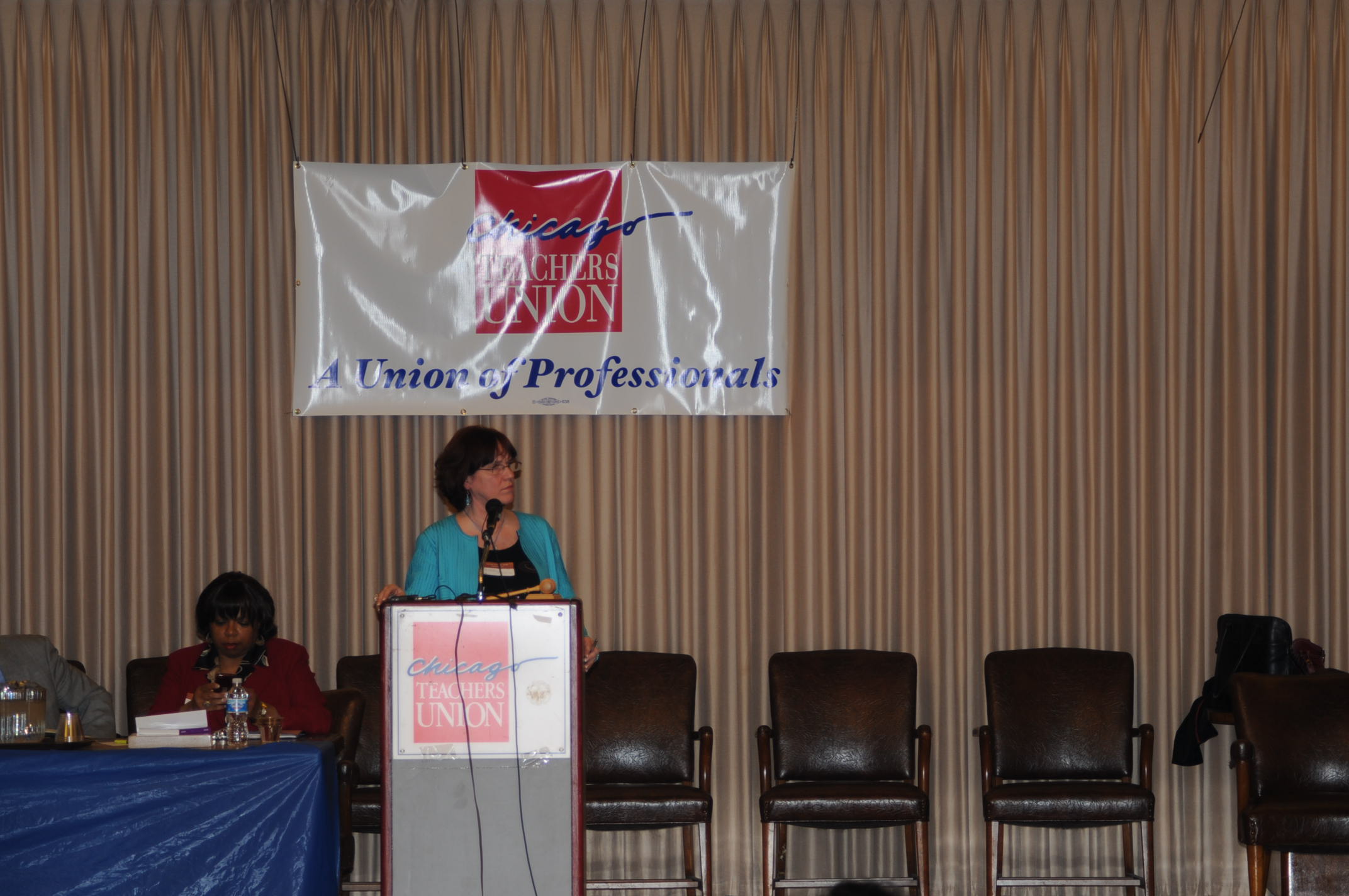 During the half hour from 4:00 p.m. until 4:30 p.m. on days when the CTU House of Delegates meets, CTU Recording Secretary Mary McGuire (above, at podium) tries to answer the many questions that come from the schools. Above, while the pre-meeting question-and-answer session goes on, Marilyn Stewart goes over her notes. The empty seats behind McGuire and Stewart on the stage were waiting for the dignitaries for the "Special Order of Business" that effectively eliminated the business part of the meeting. Substance photo by George N. Schmidt.The delegate from Willa Cather Elementary School asked what happens when teachers are notified they've been cut cut for "budgetary reasons"? Mary McGuire told the delegates that any non-renewed PAT (Provisional Assigned Teacher) would have been entered in March, notified by 30 days before end of school. She added that if the school were losing positions by budgetary cuts, teachers do not have to be notified until end of year.
During the half hour from 4:00 p.m. until 4:30 p.m. on days when the CTU House of Delegates meets, CTU Recording Secretary Mary McGuire (above, at podium) tries to answer the many questions that come from the schools. Above, while the pre-meeting question-and-answer session goes on, Marilyn Stewart goes over her notes. The empty seats behind McGuire and Stewart on the stage were waiting for the dignitaries for the "Special Order of Business" that effectively eliminated the business part of the meeting. Substance photo by George N. Schmidt.The delegate from Willa Cather Elementary School asked what happens when teachers are notified they've been cut cut for "budgetary reasons"? Mary McGuire told the delegates that any non-renewed PAT (Provisional Assigned Teacher) would have been entered in March, notified by 30 days before end of school. She added that if the school were losing positions by budgetary cuts, teachers do not have to be notified until end of year.
Beaubien Elementary School delegate Jack Moran demanded to know why a CTU official, Marc Wigler, had spoken against tenured Wells High School teachers at termination hearings.
Mary McGuire said that the hearing transcripts are available, and that Wigler "merely testified."
Citywide Delegate Pat Gerard asked about challenging mayoral control of Chicago's schools. "When will you submit a proposal for local control for the Board of Education instead of Mayor Daley?" she asked.
McGuire answered that such a question is a legislative issue. "I will look into what is required and get back to you," she said.
A special education teacher whose name we didn't hear asked why teachers don’t have computers available to do IEPs, forcing teachers to be doing them at home.
McGuire said that Information went out about deadlines about IEPs as to when they must be electronic. She said teachers should call Carla Kirkland (at the Board) 773-553-1836. She added that the union would post information when it becomes available.
Citywide delegate Pat Gerard interrupted to offer a "Point of Information." She said she is involved in special education and had attended training sessions. At least some of the trainers said it is up to the school principal to provide the computer.
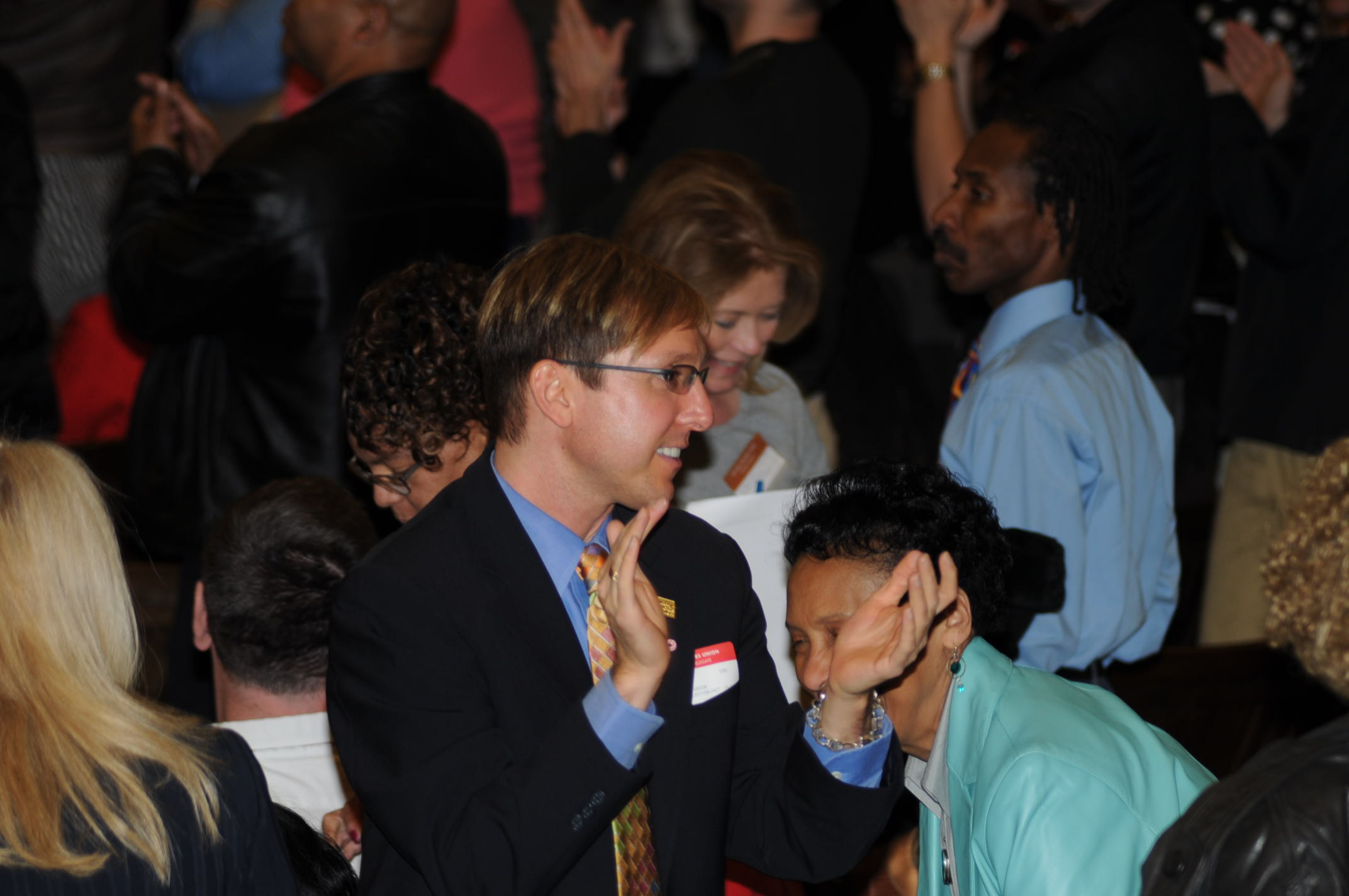 During the meeting, Marilyn Stewart's United Progressive Caucus has union staff members spread throughout the crowd to lead cheers for Stewart's positions. Above, Quest Center "Fresh Start Schools" Coordinator Marc Wigler cheers and cheerleads. Wigler has been criticized by union members and activists since he began testifying on behalf of the Board of Education at termination hearings against the so-called "Wells Four." The "Wells Four" are four tenured teachers from Chicago's Wells High School who are being fired by the Board under the provisions of "Fresh Start," which critics claim is another way the union is giving away tenure in Chicago. Substance photo by George N. Schmidt.Karen Lewis, delegate from King High School, noted CICS "Longwood" campus is also under Chicago International Charter Schools. She asked why the union could only organize charter at 75 percent of the campuses and whether that percentage true from a NLRB (National Labor Relations Board) ruling.
During the meeting, Marilyn Stewart's United Progressive Caucus has union staff members spread throughout the crowd to lead cheers for Stewart's positions. Above, Quest Center "Fresh Start Schools" Coordinator Marc Wigler cheers and cheerleads. Wigler has been criticized by union members and activists since he began testifying on behalf of the Board of Education at termination hearings against the so-called "Wells Four." The "Wells Four" are four tenured teachers from Chicago's Wells High School who are being fired by the Board under the provisions of "Fresh Start," which critics claim is another way the union is giving away tenure in Chicago. Substance photo by George N. Schmidt.Karen Lewis, delegate from King High School, noted CICS "Longwood" campus is also under Chicago International Charter Schools. She asked why the union could only organize charter at 75 percent of the campuses and whether that percentage true from a NLRB (National Labor Relations Board) ruling.
Instead of Mary McGuire, Marilyn Stewart answered the question posed by Lewis. She said that only schools on list had a group called "Civitas" as its management organization. She said that CICS has different managers than Civitas, so the rules are different.
Jesse Sharkey, the delegate from Senn High School, asked about a letter from the Chicago Teachers Pension Fund (CTPF) with sobering news that the Chicago teachers' defined benefit pension plan, 100 years old, was again under attack. Sharkey said that CTU has big role to play in safeguarding teachers' pensions. At $7.5 billion dollars (down from $12 billion dollars at the height of the stock market bubbles) the pension fund is hurting, but not desperately so. Sharkey raised Issues with a commission report that said defined benefit plans were bad and about the Daley connection (the head of which had been the Daley administration official who oversaw the privatization of The Chicago Skyway). How is the union responding to the threats to our pension, he asked.
Mary McGuire said that the pension board meetings are attended by delegate Lou Pyster. She explained that "Mercer" makes recommendation to trustees and then they vote on interest in presented portfolio. McGuire said that questions best be brought up at the pension board meetings. Questions at the pension board meetings are part of record and will bring them to pension board. Many states have gone to a "two-tiered" system, she said. She said that the chief executive of the pension fund, Kevin Huber, is always available to give information.
Boone Elementary School delegate Kelli Pfeiffer asked about the ongoing problems being faced by Middle School (and middle grades) teachers meeting No Child Left Behind "highly qualified teacher" requirements. On First Class(the Board electronic system) yesterday, she said, she saw an email about Middle School endorsement. If you were teaching in a Middle School, but not endorsed in subjects, you could lose position, she said. Will principals move you to lower grade — where you are certified if you are tenured — that would bump PATs.
Mary McGuire said that this is really indicative of how the board thinks. She said that CPS had moved to a more restrictive middle school policy than the State of Illinois. Content endorsements are more restrictive in Chicago. She said that they’ll provide interest-free loans, but not tuition scholarships, for teacher who have to take the extra courses. Then she pointed out that paradox of the Board's approach: to enforce the requirements, CPS has hired seven retired AIOs and principals to oversee it at a cost of around $1 million. "Why don’t you take that million dollars and give it to the teachers who have to go back to school to get those endorsements?" she said. She pointed out, also, that when the board says they don’t have any money, then they hire another layer of positions at a huge cost.
The Delegate from Bouchet Math & Science Elementary School asked about occupational health and safety issues. She said her building was a "Sick building." She asked what can be done when a mould and other substances are a problem, and teachers and staff have problems breathing, because of possible mould or asbestos? Going to the field rep is delaying the whole thing, she said. "I’ve called. I talked to you for about an hour."
Mary McGuire said the process has to start with your field rep. In her opinion, she said, it doesn’t serve anyone’s purpose to put people in sick buildings. She said they have team trained by OSHA to help bring schools up to code. She advised that teachers bring the problems to Rick Perrote, a union staffer, because he’s been trained. She added that there have been some articles in the Chicago Union Teacher about other buildings that have been addressed. Not something the board can ignore. Colleen Dykas, who heads the union's grievance department, gave what she called a "point of Information." She said that Rick Perrote gets a form, then sends a team out. After visiting and confirming the problem, the union tries to pressure the Board to correct situation.
The last question came from an elementary teacher at a 'Language Academy.' The teacher said "We have 13 teachers affected by this endorsement. If police required to have specific knowledge, they are paid to get knowledge." She asked how teachers are required without possibility of paying and training. There are single parents that do not have the discretionary funds to pay for this kind of training.
Mary McGuire responded that the employer, the Board, is not obligated to pay for those courses. She said the leadership is aware members need to take the classes. In the Delegates' packet, Chicago State lists two classes required for endorsements. She said the leaders are trying to negotiate for some kind of concession. Morally, they are responsible to each and every one of us. Members already have other certificates. If you are unable to complete the coursework, supposed to be informed by principals what forms to fill out to move around to other positions. She repeated that seven people had been hired as additional layer of administration. Last day for principal to submit plan for school regarding middle school endorsement day before Spring Break.
Special Order of Business basically cancels business meeting for Delegates
As Marilyn Stewart moved to begin the portion of the meeting covered by the "Special Order of Business" that hadn't been voted on, retiree delegate Lou Pyster asked why the leadership was preempting our meeting with Randi Weingarten and when will we be able to ask her questions.
Mary McGuire said that the leadership intended to have the meeting, but that it was being delayed because of the Special Order of Business. Marilyn Stewart said that Randi had to rearrange her schedule to be here in Chicago, that it was the only time possible. Marilyn Stewart then called the meeting to order introducing the sergeants-at-arms and the parliamentarian. After the introductions, she gave an overview of procedures for the House of Delegates and stated that the meeting would move to a Special Order of Business. Supported by the parliamentarian, she claimed that under CTU By Laws, the president has the privilege for presenting items on the agenda in the manner deemed expedient and appropriate. One of the matters is to accommodate the schedules of a number of people that let’s us deviate from the normal series of events. The normal rules of the House are suspended for a Special Order of Business.
During the meetings there are usually four microphones placed in the hall so that delegates can debate matters and raise questions. When Stewart announced the Special Order of Business, the microphones were taken out of their usual postions and pushed to front.
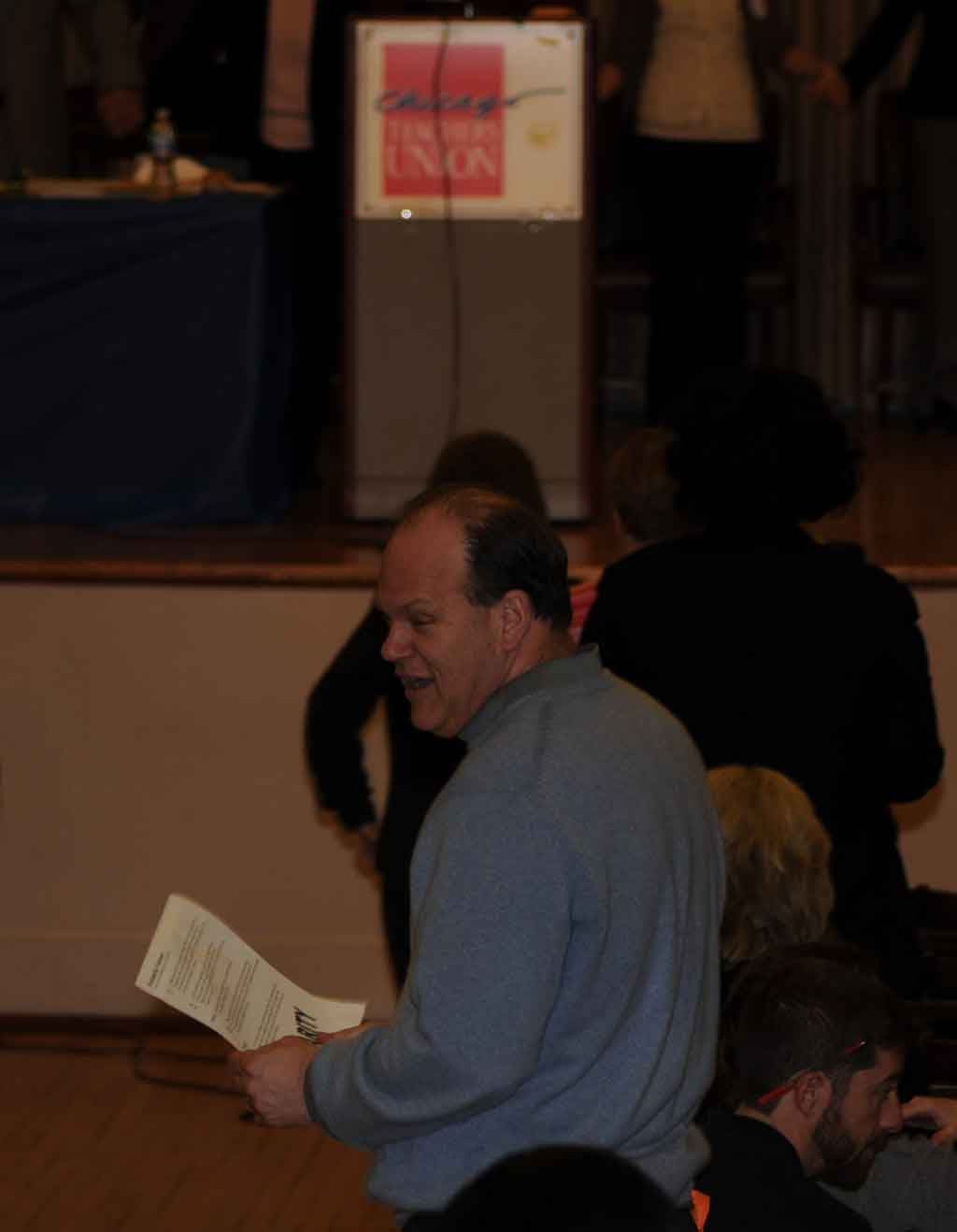 Whitney Young High School delegate Jay Rehak (standing above) and Little Village Social Justice High School delegate Jackson Potter (seated, right) were two of the delegates who questioned why the media event had to pre-empt so much of the House of Delegates meeting. Substance photo by George N. Schmidt.A minor commotion followed, with CORE members Jackson Potter (delegate, Little Village Social Justice High School) and Jay Rehak (delegate, Whitney Young High School) tried to call for a Point of Order on the decision to interrupt the regular meeting. Jay was holding up a copy of Robert’s Rules of Order. Despite the protest, Marilyn Stewart continued her agenda.
Whitney Young High School delegate Jay Rehak (standing above) and Little Village Social Justice High School delegate Jackson Potter (seated, right) were two of the delegates who questioned why the media event had to pre-empt so much of the House of Delegates meeting. Substance photo by George N. Schmidt.A minor commotion followed, with CORE members Jackson Potter (delegate, Little Village Social Justice High School) and Jay Rehak (delegate, Whitney Young High School) tried to call for a Point of Order on the decision to interrupt the regular meeting. Jay was holding up a copy of Robert’s Rules of Order. Despite the protest, Marilyn Stewart continued her agenda.
The first item at each meeting consists of announcements of members who have died during recent weeks. When that was going on, the floor microphones had been returned and about a dozen delegates gave the names of colleagues who had recently died.
Marilyn Stewart then asked the delegates to remain seated while the guests arrived. Jackson Potter tried to ask a question of privilege about the interruption. Stewart referred it to the parliamentarian. Jay Rehak, Ray Wohl (Thurgood Marshall Middle School) and Lou Pyster (retiree delegate) approach parliamentarian Mary McGuire at stage discussing the interruption. Suddenly, the line of guests came into the hall. Marilyn Stewart asked everyone to "stand to welcome our special guest and dignitaries."
"Thank you for being here to recognize this success story of organizing charter schools in Chicago," Stewart began. She spoke of the history of the Chicago Teachers Union, how CTU became Local 1 of the American Federation of Teachers 75 years ago. She said that "educators had had enough, so in 1937 they formed a union, but it wasn't until 30 years later CTU got a contract." She held up a book that she said was the 1967 one-year contract. "We’re trying to cut down that process," she said. Stewart recounted the fact that from 1967 to 1987 CTU "had these regular things called a strike." Stewart told the delegates that the current CTU contract is very good. "Have a lot of benefits that we did not have to strike about," she said. It's unprecedented to have still a four percent raise and health benefits. We got something that a lot of people didn’t get," she said.
Stewart told the delegates that what she called the "Corporate mentality" out there is trying to pit one worker against another. "These charter teachers who have pushed for a professional voice, sought our help to join our union," she continued. She told the delegates that over the past three months, the CTU has backed Resurrection Health Care workers, Congress Hotel workers, the EFCA, the police, and now the new charter teachers. Stewart joined in the criticism of Chicago's mayor. "Daley says this is a union town," she said. "We want the Olympics want the union to build it."
She continued about solidarity "You take on one of us, you’re taking on all of us," she said. She then introduced the "honored guests here." Dennis Gannon (of the Chicago Federation of Labor); Terry Davis (Jobs with Justice); Ed Geppert Jr. (Illinois Federation of Teachers); Randi Weingarten (President of the United Federation of Teachers, New York City, and the American Federation of Teachers); and Jeremy Lee, a new union member from Chicago International Charter Schools (), a 4th grade teacher.
She then introduced the leaders of the other unions, some of whom that work for CPS. Bill Iacullo (Operating Engineers); Mark Donahue (Fraternal Order of Police) and a leader of the Coalitioin of Black Trade Unionists.
The first speaker from the guests was Dennis Gannon, President of the Chicago Federation of Labor, who focused on the federal "Employee Free Choice Act" (EFCA).
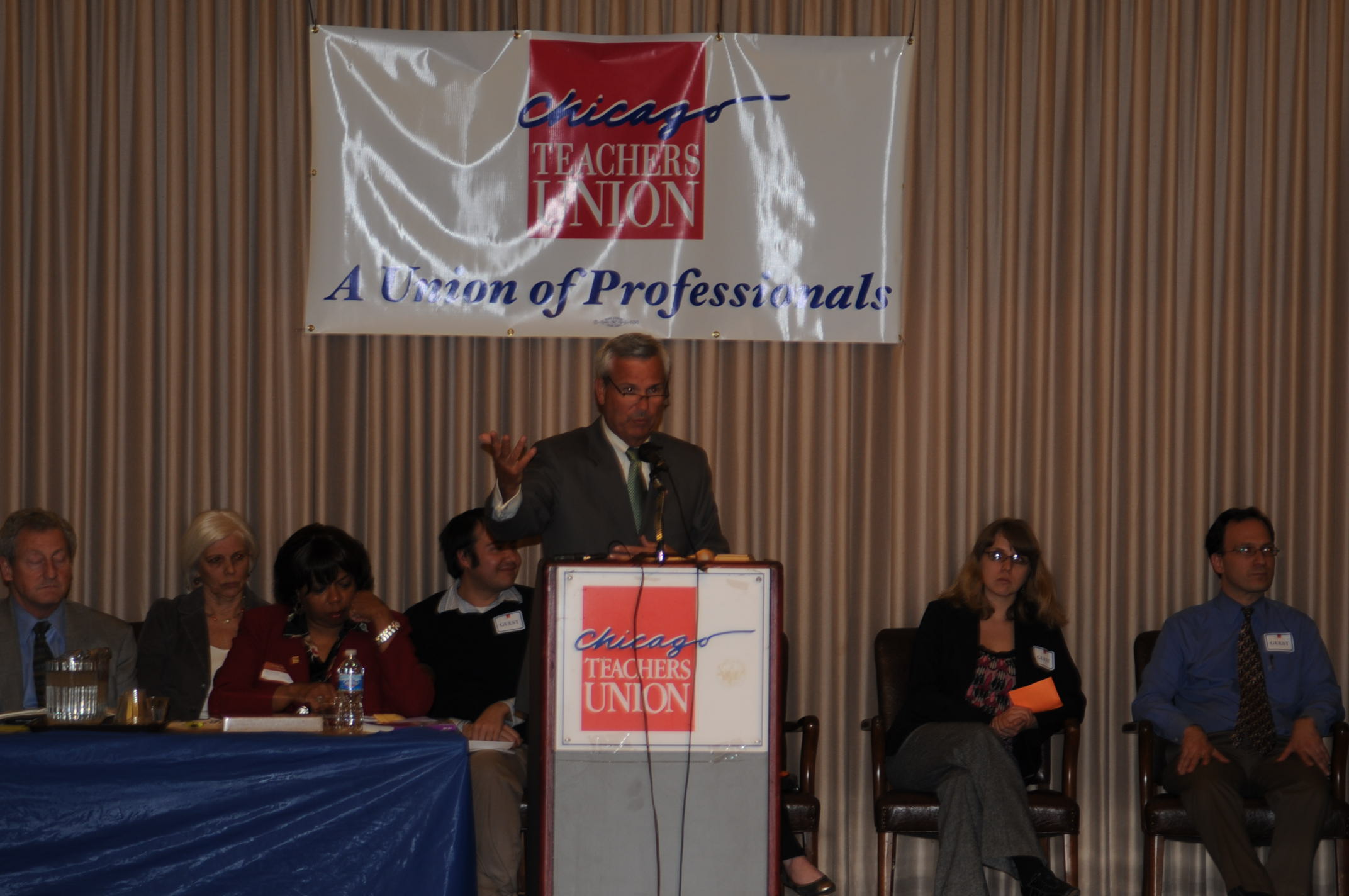 Dennis Gannon, President of the Chicago Federation of Labor (CFL) told the delegates about the need to support the federal Employee Free Choice Act (EFCA), which is now before Congress. Gannon answered many of the criticisms that have been financed by conservatives against unions and the EFCA. Substance photo by George N. Schmidt.Gannon told CTU delegates not to lose sight of the significance of the moment. Mayor Daley has fought this. "Your organization has stood up against charters, but now you’re organizing them. "We as a labor movement must stand behind these folks with their first contract. That’s when the rubber is going to meet the road. 75 percent of those members said, 'Yes, we want a union.' Make sure they get a good contract and fair contract." Now the rest of the unions and the city to ensure they get that in the quickest time possible.
Dennis Gannon, President of the Chicago Federation of Labor (CFL) told the delegates about the need to support the federal Employee Free Choice Act (EFCA), which is now before Congress. Gannon answered many of the criticisms that have been financed by conservatives against unions and the EFCA. Substance photo by George N. Schmidt.Gannon told CTU delegates not to lose sight of the significance of the moment. Mayor Daley has fought this. "Your organization has stood up against charters, but now you’re organizing them. "We as a labor movement must stand behind these folks with their first contract. That’s when the rubber is going to meet the road. 75 percent of those members said, 'Yes, we want a union.' Make sure they get a good contract and fair contract." Now the rest of the unions and the city to ensure they get that in the quickest time possible.
Gannon then went on to explain the relationship between the charter school organizing and the "Employee Free Choice Act" (EFCA) being battled out in Washington, D.C. He said that the legislation was about one thing ±leveling the playing field for all of us. "It’s about the companies intimidating workers, harassing workers, firing them if they want a union," he said. "This should be a basic right. We haven’t had any type of legislation in this country in 40 years to help workers. It’s been a lifetime. It gives workers that want to sign cards, the majority to join a union and have an open and free election. They can collectively bargain themselves back into the middle class."
Gannon pointed out that for the past decades, employers have been using loopholes in current labor law to stall and thwart union organizing in the private sector. "Statistics will tell you that 25 percent of members with you doing an organizing drive get fired," he said. "92 percent are forced to attend mandatory meetings against unionization by employers... 51 percent say 'If you organize, we’re going to close and open elsewhere.'" Gannon said that the EFCA was first brought to the Congress four years ago, and it passed House of Representatives. He said that last year, it couldn’t get to closure in Senate. He told the delegates that big business has put $200 million against passing the EFCA. He said that the February 17 EFCA rally at Plumber’s hall, drew, probably, 3,000 people and it was a very moving experience. "Workers were here who have tried to organize who told their stories" and it was moving. Gannon said that President Obama has said that he will sign the bill once it gets to his desk. He reminded the delegates to make sure that (Illinois) Senators Burris and Durbin know where everyone stands." Write your congressfolks and talk to your senators. This bill will change the lives of people. It will be a stimulus," he said.
Terry Davis of Jobs with Justice spoke next. She said she is a proud mom and grandma of CPS students, adding that "Two members of your union are my kids." Jobs with Justice is a coalition of unions, community organizations and religions groups to come together for each others fights and struggles. We’re 100 percent behind these brave charter school teachers. Teachers need union representation, she said. She added that the EFCA is not just for the union, but when it passes and people in our communities will improve their standard of living, move to getting benefits, job security and stability for their families.
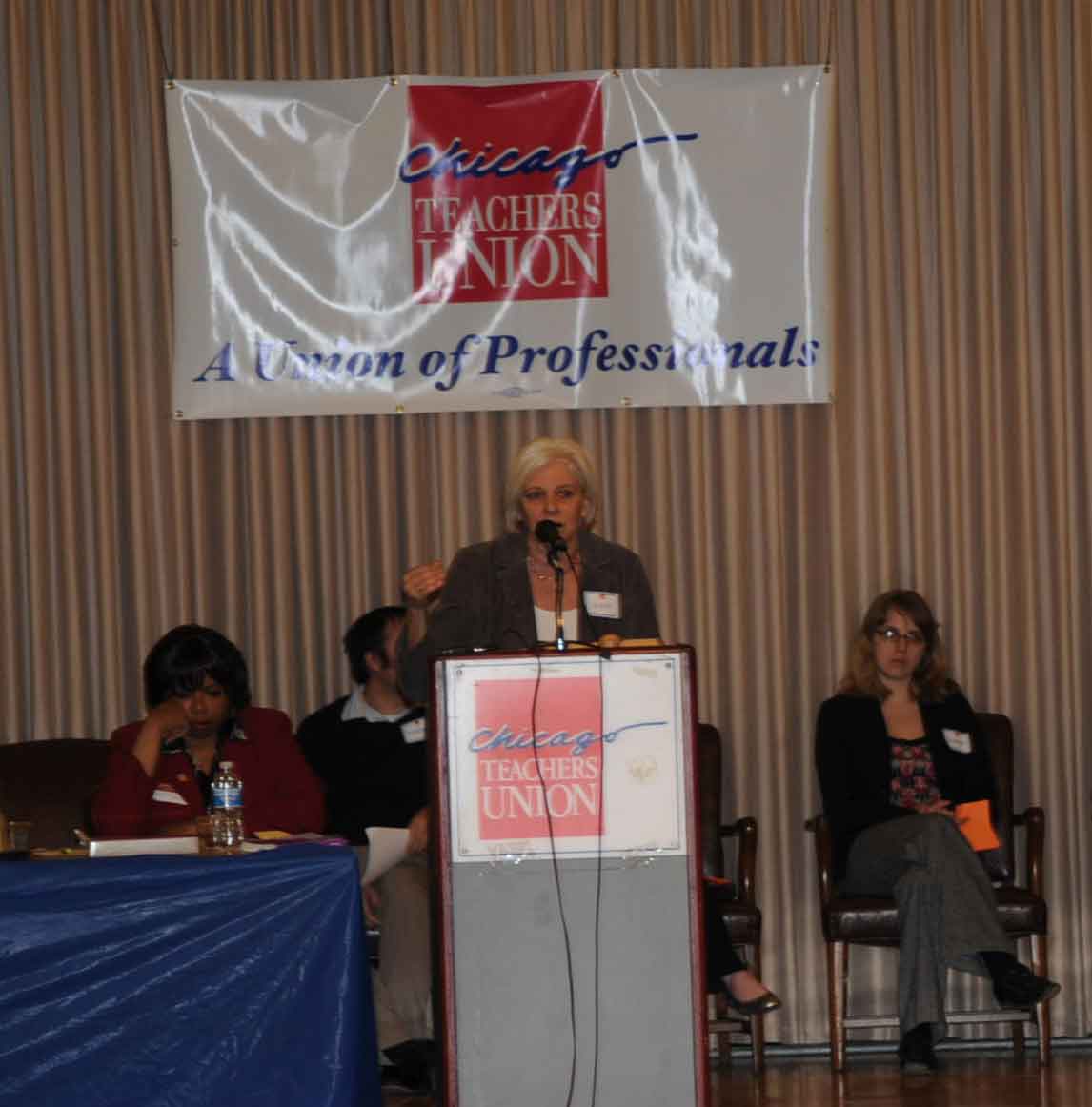 Terry Davis of Jobs for Justice. Substance photo by George N. Schmidt."You know what that means to kids when they have stability at home," she continued. "When there’s more stability, there’s less violence and less poverty. When people are in a union, they are organized. They’re organized to learn about the issues of the day and organized to talk about them. We need to educate our communities and our fellow union members about EFCA. Unions are part of the solution and not part of the problem..."
Terry Davis of Jobs for Justice. Substance photo by George N. Schmidt."You know what that means to kids when they have stability at home," she continued. "When there’s more stability, there’s less violence and less poverty. When people are in a union, they are organized. They’re organized to learn about the issues of the day and organized to talk about them. We need to educate our communities and our fellow union members about EFCA. Unions are part of the solution and not part of the problem..."
Ed Geppert said he represent the Illinois Federation of Teachers (IFT), with 90,000 members in Illinois. He urged the delegates to applaud, congratulate these teachers. "They studied the issues and decided they needed an organization that provided them with democracy," he said. He said that the union would now be "Moving on from Civitas and moving on to the other charter schools in the city of Chicago."
Geppert said: "Today, the charter school movement pits teachers against teachers. We’re all teachers." He said that a perfect example is that all around the state of Illinois all teachers are talking about revenue and pensions. "These impact charters and public, they are all public schools and they are public funded pensions," he continued. "We’re not going to be able to fund our schools unless our teachers, the charter teachers, and our communities say we want our income and pensions protected."
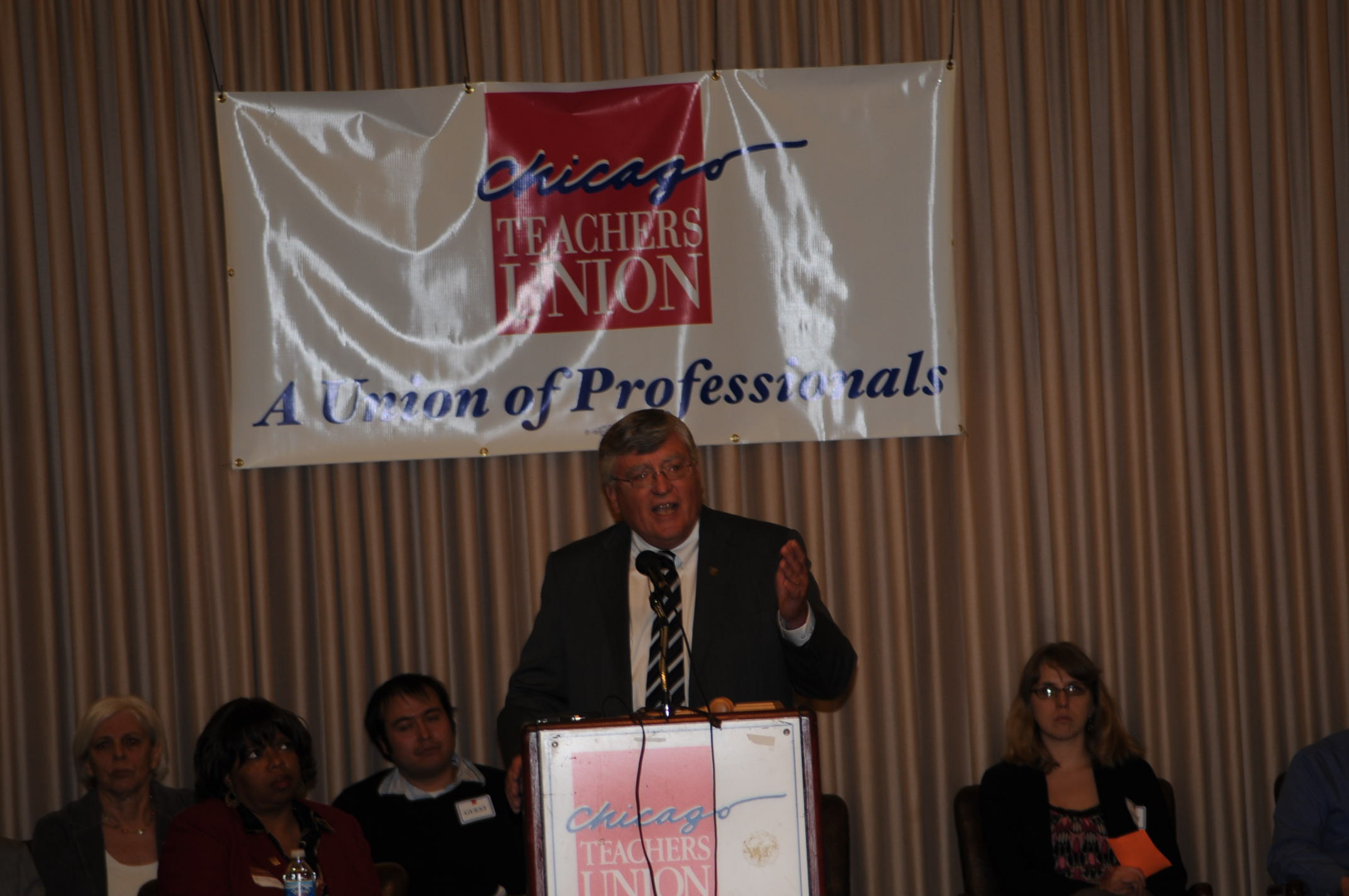 Ed Geppert, President of the Illinois Federation of Teachers (IFT) talked about the need to organize. Substance photo by George N. Schmidt.Geppert noted that in the three schools organized, over 75 percent of the eligible bargaining unit members signed cards requesting representation. In 30 days, they could possibly be recognized and not have to go through an election which allows the employer to put up meetings and harassment. "We know Civitas received $49 million in public funds," Geppert continued. "it’s a public school. We salute them."
Ed Geppert, President of the Illinois Federation of Teachers (IFT) talked about the need to organize. Substance photo by George N. Schmidt.Geppert noted that in the three schools organized, over 75 percent of the eligible bargaining unit members signed cards requesting representation. In 30 days, they could possibly be recognized and not have to go through an election which allows the employer to put up meetings and harassment. "We know Civitas received $49 million in public funds," Geppert continued. "it’s a public school. We salute them."
The next speaker was Jeremy Eric Levy, a teacher at Chicago International Charter School (Northtown). He told the delegates that their first union organizing meeting was a year ago this month, and that at the time it was "inconceivable that would be standing here" like this.
He introduced others from CICS: Joyce Pay (3rd year at Ellison HS); Camilla Jarvis (Ellison); Jennifer Gilly (Ellison); Emily Muller (Northtown); and Laura McMann (Wrightwood)
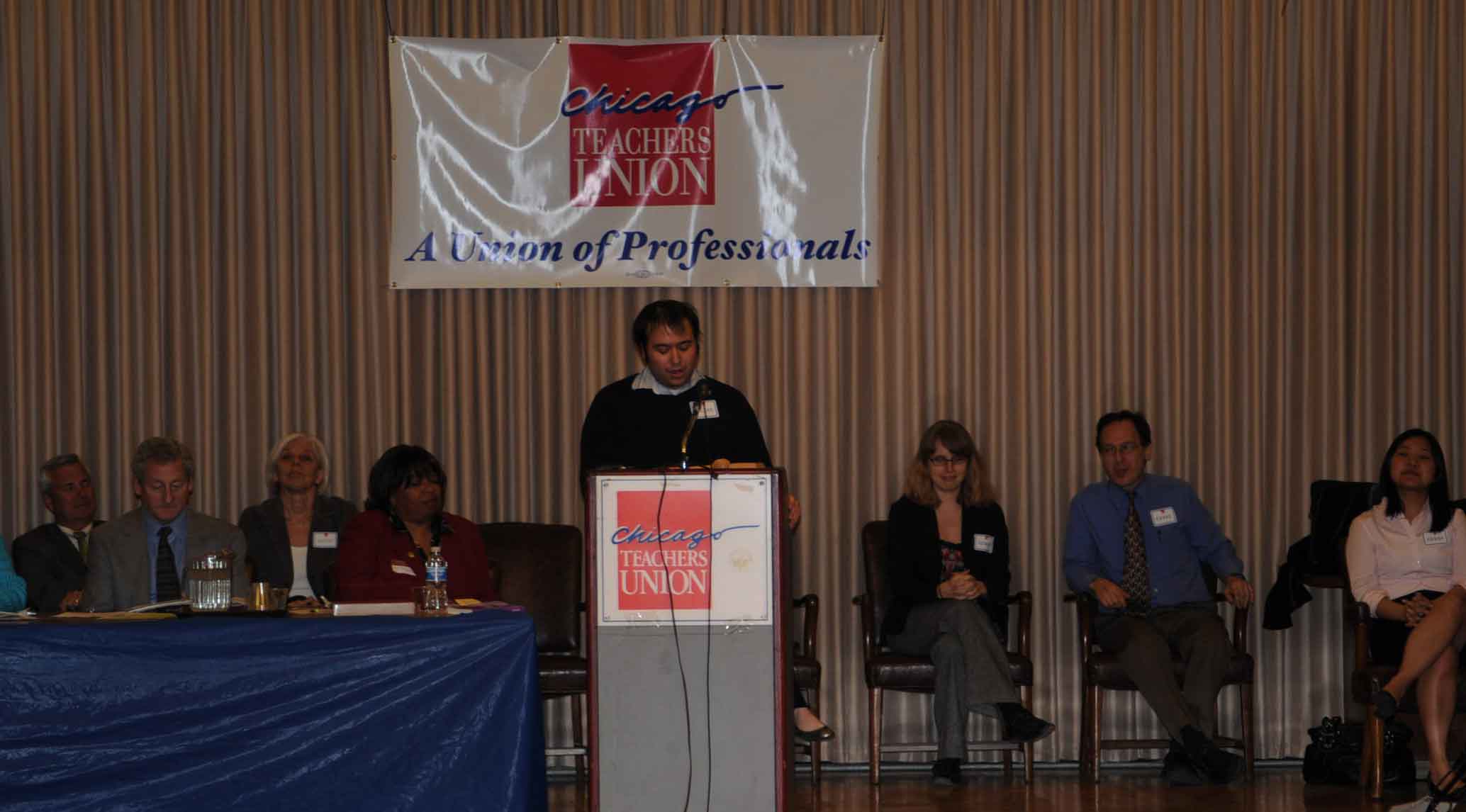 Chicago International Charter School (CICS) teacher Jeremy Lee spoke to the delegates about how he and his colleagues (some of whom are seated to his left behind him) came to organize Chicago's first charter school union. Substance photo by George N. Schmidt."I stand with more than 32,000 Chicago union teachers, 98,000 Illinois teachers and 1.4 million educators with the AFT as a charter union teacher," he said, amidst applause. "While charter schools may be a new concept, dividing and conquering labor is a centuries old process. We must not let them divide us. In the end were are all educators, who want to give our children the absolute best education. We organized for a whole host of reasons, prof development, stability, teachers at formal seat at the table on decisions that affect our schools..."
Chicago International Charter School (CICS) teacher Jeremy Lee spoke to the delegates about how he and his colleagues (some of whom are seated to his left behind him) came to organize Chicago's first charter school union. Substance photo by George N. Schmidt."I stand with more than 32,000 Chicago union teachers, 98,000 Illinois teachers and 1.4 million educators with the AFT as a charter union teacher," he said, amidst applause. "While charter schools may be a new concept, dividing and conquering labor is a centuries old process. We must not let them divide us. In the end were are all educators, who want to give our children the absolute best education. We organized for a whole host of reasons, prof development, stability, teachers at formal seat at the table on decisions that affect our schools..."
Lee pointed out that Chicago International Charter Schools "cut teachers out of the process, that’s what charters do... We have stood up and said enough is enough... 75 percent of us, we signed our authorization cards in our bargaining unit. We took the step to form Chicago’s first unionized charter school. The working class is being squeezed. No one is going to give us a bailout. Union labor must fight for a prosperous middle class. Our administration has yet to recognize us. We know we can count on our fellow brothers and sisters to demand that our principal does the right thing and demand the bargaining process..." Lee asked the delegate "Go home tomorrow and call Dr. Purvis [head of CICS) to do the right thing and recognize us. I am confident that more charters will join the family," he concluded.
National Union President Speaks at Length.
The next speaker was American Federation of Teachers (AFT) President Randi Weingarten, who began her speech with some microphone swapping. Weingarten, it became clear, was not going to speak from behind the podium, but walk the stage. She also had someone videotaping her speech, and that person ran from the back of the hall to the front to make sure she was using the right microphone before she began. Weingarten was elected President of the AFT in July at the union's convention in Chicago and has been doing double duty as national president and president of the huge New York City K-12 local (the United Federation of Teachers) since her election to the national office. "It is really hard to be a school teacher these days," Weingarten began, "I feel…that every single day we are asked to do more with less."
Then she immediately went into the first major point of her speech: that Barack Obama was a friend to the AFT.
"It is an unbelievable change to have Barack Obama as president, and not George W. Bush," she continued. She admitted that some of Obama's policies drew criticism from teachers: "You hear it around the country," Weingarten continued. "Why did he say that about… I often say to people 'What do you think would be happening right now if John McCain was president?' We have the worst economy since the Great Depression... I have often said in union audiences, I have asked people, 'How many of you know one person or more who have been laid off in the last six months?'"
At these points, Weingarten asked the audience to participate, by raising hands. "How many of you have at least one student whose parent or guardian has been laid off — or [have a] parent is going to lose their home? Or who doesn’t have a parent or relative in the country — and is alone? One kid said to me: 'I don’t know what to. My parent lost his job and it’s just really really quiet. I don’t know what to do.'" Weingarten said that the EFCA is about the what to do. "I don’t get why the work that we do — which is such God’s work — is so hard," she continued. "We toil in the public schools... Most of us went into this work, certainly not for money and I don’t know any teacher who gets anything remotely like an AIG bonus.." After mentioning the Wall Street insurance people for the first time, she returned to education. "Even what Michelle Rhee [the superintendent of the Washington, D.C. public schhools, who wants to introduce merit pay throughout the D.C. school system] wants to pay some teachers isn’t like an AIG bonus. We go into this work because we want to improve the lives of our children. We go in to work in schools where we have kids whose family lives can make us cry..."
"If you look at this country, economically in the last ten, 15 years," she went on, "one in ten people did hugely great. The offices of the AFT moved down to Ground Zero because we could get a good price on an office building. We did a lot of cleaning to get the asbestos off when all those buildings were pulverized. So we saw for the last five, six, seven years, we saw the wealth, the avarice, the greed [that came from around the corner of the UFT offices, which was located near Wall Street." Weingarten pointed out that the percentage of working people in unions was at a low not reached since the Great Depression, and that there was a relationship between problems today, union organizing, and what was going on on stage.
What happened to the middle class? Defined pension plans? Why are we the ones in this fight right now? Why are you so special teachers, public workers? These folks behind us are the living example...
While the AFT probably has the videotape of her speech, we'll offer as many of the highlights as possible here.
We didn’t have to fight to have a voice that worked! We could say that’s too much testing. We have other work to do! Now that we are down to seven percent (of workers organized into unions), we fight every day to even hold our own! Our members did not create this calamity, but our adversaries still continue: "Give up public education for kids! Give up your benefits!" "The one thing I give him [President Obama]," she said, "because he does get in his gut that education and the economy are tied together." She was very emphatic about how significant the Obama administration's economic policies were to AFT members. "If we did not have and get the stimulus packages that Illinois, New York, California and other states got," she emphasized, "we’d be having a very different discussion right now. We’d be having the discussion about thousands and thousands of educators who were losing their jobs."
She stated that without the federal stimulus money, New York would have to lay off "all of our first, second and third year educators... Yes, the stimulus has strings attached to it — and things we don’t like, but it is a way to give us a lifeline so we can fight another day. You are living every single day in your classrooms with the ravages of this economy and with a school system that wants you to do more with less. They didn’t give us a pot of gold. That’s part of why I’m thanking you. But I’m also thanking you for what you’re about to do for these charter schools..."
Then she turned to the topic of the evening, organizing teachers in Chicago's charter schools.
"So, Jeremy," she said, "you’re not alone….I left talking about these folks for last, since we all have experienced the kinds of intimidation that this big agreement is intended to protect us against..."
Speaking about our union contracts, she held up a copy of the current Chicago Teachers Union contract, noting how large it is. "I often say that many of the provisions are in many of our contracts because of some stupid administrator that did something pretty dumb," she went on. "When you have a lot of stupid administrators, you end up getting a lot of provisions...."
She then went on to defend charter schools and the organizing of charter school teachers. "But what the charter school movement has done and it was right. Al [Shanker, who was AFT President for two decades] was one of the creators of the charter school movement," she said. "What a lot of people in the charter schools have done is this. They had a vision like many on Wall Street did. If they would say "Sit!" and we say "Yes sir!" If they told us to do something, we would say, "When do you need it?" If they told us to have 500 kids in our classes, we would do it…" she went on.
She then repeated a version of the history of teacher unionism and contracts for teachers. "That is a time many school teachers don’t remember," she continued, "but a time that people had before the creation of teacher unions. That was a time well before this contract and we fought to have some basic dignity and rights."
She then went into a critique of charters as they now exist. "The charters have a vision that as long as you educate some kids to pass some tests it is by any means necessary and be gone those of us who believe that education is about more than that. That teachers are a huge spoke in that. If they want to make it a career, they should have the right to fight for the economic dignity they deserve. That’s why these folks are so courageous..."
At that point, she talked about some recent activities in New York involving the KIPP charter schools, which are also in Chicago. Apparently, some of the teachers at the KIPP charter schools decided to organize, and the right wing media went after the. "That’s what the KIPP teachers went through last week," she continued. "Then the KIPP teachers had eight days of horrible vicious articles and editorials about why the AFT is so bad. I’ve seen things about the union staff, vicious lies. The charter movement is really afraid of what we’re talking about. They are afraid if we march together on behalf of kids and basic economic dignities of educators and laborers. I moved heaven and earth to be here with you today to say 'Thank you for being willing to have a voice. Thank you for being optimistic. Thank you for being willing to do it every day in your classrooms and every day as union activists.' This is an amazing day for us."
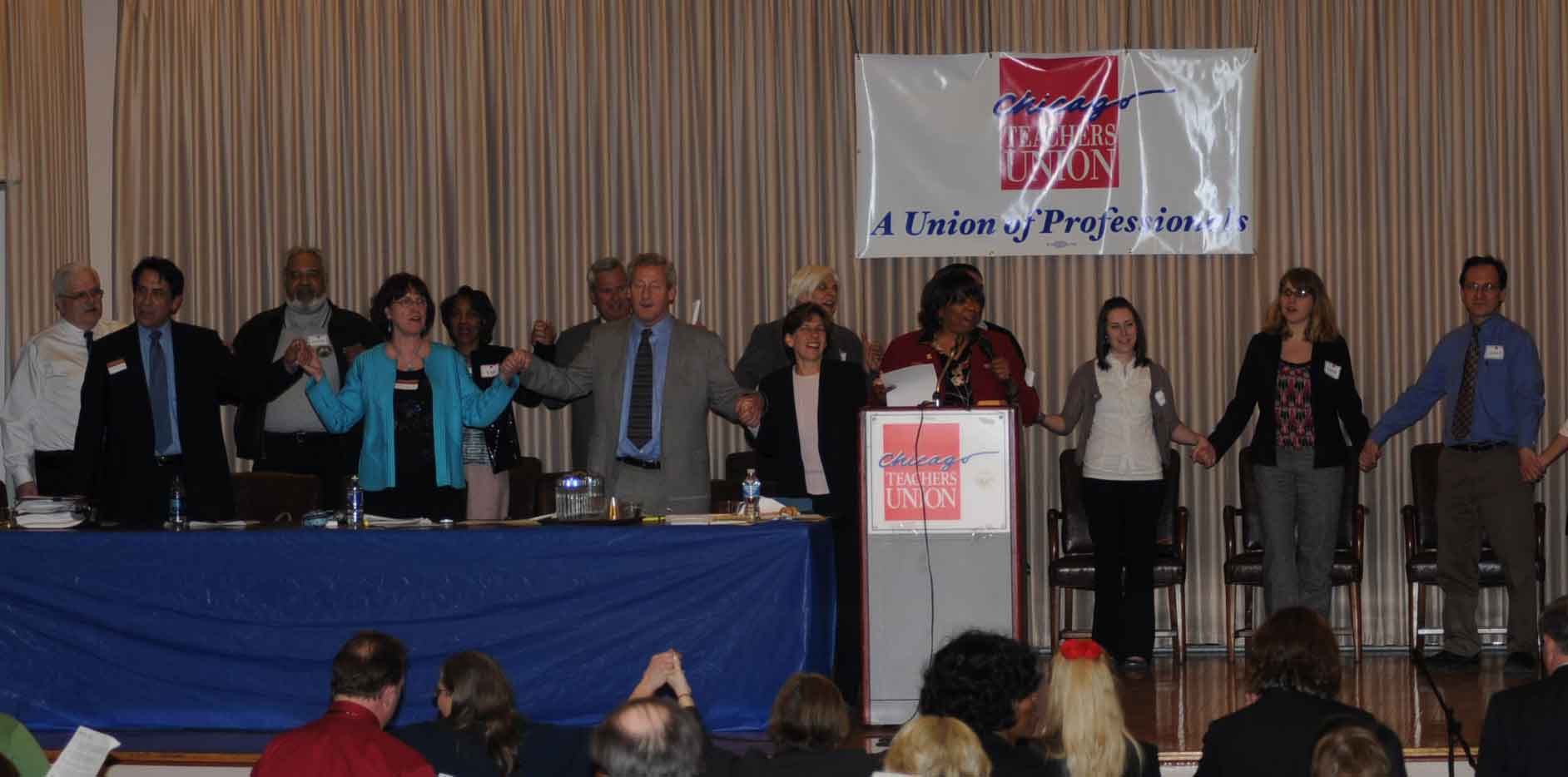 At the end of the charter school organizing presentation, everyone was supposed to join hands to sing the traditional labor song "Solidarity Forever." The singing ran into trouble, however, when an edited version provided by the CTU leadership confused those who knew the actual words of the song, and things continued in a spirited way, although with much confusion. Substance photo by George N. Schmidt.At that point, Marilyn Stewart, Randi Weingarten, and those on the stage joined hands and began singing a version of the union song 'Solidarity Forever' that had been distributed in the hall, rewritten for the occasion.
At the end of the charter school organizing presentation, everyone was supposed to join hands to sing the traditional labor song "Solidarity Forever." The singing ran into trouble, however, when an edited version provided by the CTU leadership confused those who knew the actual words of the song, and things continued in a spirited way, although with much confusion. Substance photo by George N. Schmidt.At that point, Marilyn Stewart, Randi Weingarten, and those on the stage joined hands and began singing a version of the union song 'Solidarity Forever' that had been distributed in the hall, rewritten for the occasion.
Questions for Randi
The song was followed by questions for the national union president. Chicago Vocational Delegate Carol Caref asked: "Teachers are concerned with the possibiityof merit pay and tying our pay to our kids' test scores. The TAP program which the union is supporting that has an element of merit pay in it."
"The word merit pay and what it connotes is toxic," Weingarten answered. "The bottom line is this, [pause] we will end up and you know this better than most, because the Secretary of Education was your superintendent. I do these [delegate] meeting every month and I could do this like you guys do this and I love it..."
She made a point about President Obama: "The person who won the presidency was very direct about wanting to have two things in schools — performance pay tied to student outcomes, and he wants to lift all caps on charter schools..."
"The dilemma we have is this," she said. "We could actually just say no. We could do that. And what will happen to us. In a lot of place we did just say 'No!'. What happened during the Bush administration was the complete marginalization of unions. It is the easier course and the less courageous course — 'No!' It’s the better course, ultimately, if we figure out how to engage with them on issues we find important," she continued. Her lengthy answer to the question caused many delegates to want to follow up with additioal questions, but the following is essentially what she said. "I promised when I got out of New York I wouldn’t sweat any more. Even if we’re uncomfortable, how to engage in issues, we may be uncomfortable with. Just because tenure in my view is sacrosanct. The moment someone has passed a probationary period and been rated satisfactory, they should have job security, not a job for life. In my view, the same is true with a lot of what people call merit pay. So if someone tries to pay teachers on the individual scores of their kids, when they have no control over the conditions of the kids, it’s not right," she added.
"But there are things about differentiated pay we would find acceptable," she continued, "like NBCT. We already have differentiated pay in our contract if you get additional courses. Why is that a bad differentiation? [teachers who go into tougher schools] They are willing to give us a place at the table. If we want voice, we have to take a place at the table. We just hate them when they just say No. So what I’m asking if not to say yes to stupid, arbitrary, capricious ideas that should never see the light of day. What I’m asking is to engage in the discussion. What is your idea about having an effective evaluation system? That is engaging in the debate..."
During Weingarten's discourse on merit pay, King High School delegate Karen Lewis corrected her with a point of order because Randi had called Arne Duncan's the "superintendent" when his title was CEO and he had no qualifications to be a superintendent in Chicago or anywhere else in Illinois.
After a bit of discussion about citywide and substitute teacher problems, she talked again about delegate meetings. "What I love about this delegate body, and about the New York delegate body," she said, is how much discussion there is. "When we say voice, we mean it. When I don’t know the answer, I’m going to tell you I don’t know the answer. This is the fiduciary relationship leaders have with membership. Frankly, there’s a lot of problems in New York. The labor movement is not the cause of war. I only have one rule, in a meeting of educators, respect each other. I don’t get involved in different cities of whether they’re hosting a civic event.,," Rather than discuss issues about teachers being displaced in Chicago, she told Chicago delegates to give her more information via e-mail: rweingarten@aft.org.
"I will try to get an answer," she said. "Your union is your union and there are things we can control and things we can’t. We don’t really control if there’s war in the world..." Lou Pyster, retiree delegate, spoke in general and then asked about "Fresh Start." "I have been to a dozen AFT conventions..." Pyster began, "My question is, we need to talk about various issues. Unfortunately, one that was not discussed in this delegate body is what we call 'Fresh Start.' Over the years, those are serious issues, and it requires us to have a conversation here. In NY, you have [school based bonus plan]…I am asking is, could you ask Ms. Stewart at some meeting soon to describe to this House and to the members and exactly what those programs are. We have never had a conversation. We have had soundbites. They may sign off on it. Peer review is mentioned. I think it would be in the best interest of this organization and the AFT. Randi-I think you just did..."
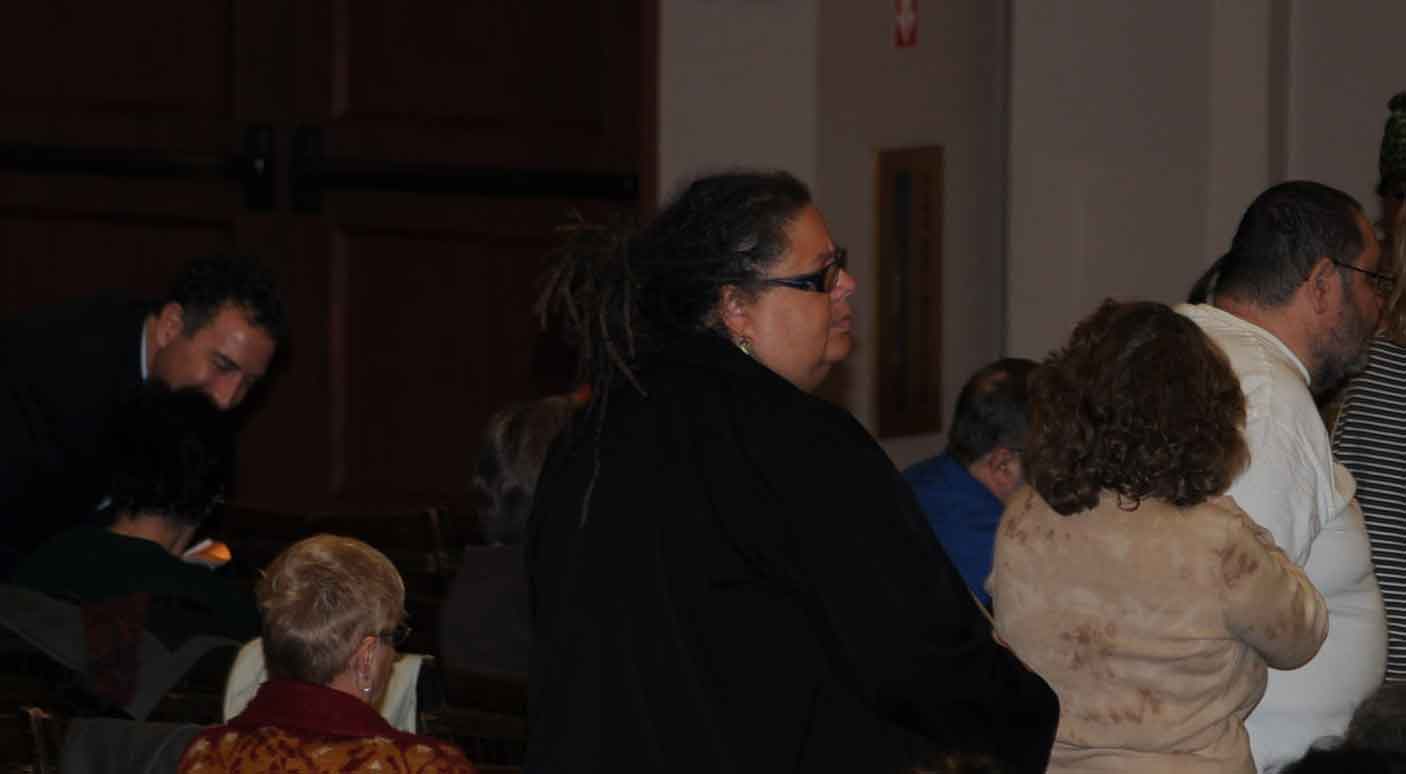 Karen Lewis (above, center) corrected Randi Weingarten when Weingarten referred to Arne Duncan as Chicago's former "superintendent." Lewis pointed out that Duncan was a "CEO" and had no educational credentials, training or qualifications. Substance photo by George N. Schmidt. Karen Lewis of King High School pointed out the fact that the meeting was not allowing for the dialogue that Randi was speaking of. "One of the real concerns of any deliberative body who are bright, hardworking and serious, we do not have the real time to meet, to make real decisions in this House of Delegates," she said. "We need to be able to have the time to have the issues dealt with…Do you not only believe in a member driven union, but how is organizing done on the national level so that we don’t just hear the voices of the leadership of the members. We are divided. At what point does the AFT make that move in that direction..."
Karen Lewis (above, center) corrected Randi Weingarten when Weingarten referred to Arne Duncan as Chicago's former "superintendent." Lewis pointed out that Duncan was a "CEO" and had no educational credentials, training or qualifications. Substance photo by George N. Schmidt. Karen Lewis of King High School pointed out the fact that the meeting was not allowing for the dialogue that Randi was speaking of. "One of the real concerns of any deliberative body who are bright, hardworking and serious, we do not have the real time to meet, to make real decisions in this House of Delegates," she said. "We need to be able to have the time to have the issues dealt with…Do you not only believe in a member driven union, but how is organizing done on the national level so that we don’t just hear the voices of the leadership of the members. We are divided. At what point does the AFT make that move in that direction..."
Randi handed microphone to Marilyn Stewart. Stewart claimed that the union has been having what she called "mini-meetings like at delegate training."
Marilyn Stewart claimed that the CTU had been having those kind of dialogues. "There’s nothing to hide," she said. "We’re here to better what we do... I’m not afraid of those questions..."
Stewart then proceeded to give a rambling account of how "Fresh Start" works without answering the question: When and how was Fresh Start presented to the House of Delegates and approved by the House of Delegates.
What follows are notes from Marilyn Stewart on Fresh Start: The schools that were in the Fresh Start schools were not closed. Fresh Start didn't begin in Chicago, but was the "Toledo Plan", 25 years ago. CTU leadership threw it out to 600 schools. It’s peer mentoring. It’s like having a student teacher, we want that teacher to be the best teacher in the world. The 10 Fresh Start schools, we laid this out. The teachers had to vote…
This is how we’re moving the middle in favor of the teachers. These teachers are our members.
It also became clear that the House of Delegates had not been consulted before Stewart began the "TAP" (merit pay) program.
According to Marilyn Stewart, the TAP program began when CPS applied for a grant from the U.S. Department of Education and got it in the amount of $27.5 million. Stewart said that originally the district put it on the schools with no union input. You know how CPS can mess up something. You can’t do this this way. The first part of the TAP program, students scores, school-wide incentives, bonues, they close the schools that don’t have score, then give bonuses to teachers who are working hard to improve the scores. They had to vote to be a part of the TAP program also. We can’t pick our students…
Stewart then rambled into some challenging observations about students in the upper grades of elementary school, which will not be quoted directly here, but hopefully will be available when union members are provided with the complete stenographer's transcript of all union meetoings.
Stewart then went into her report, which included a part of about financials (net asset increase over $7,000 in February... Expenses below budget... Revenue above. "A million dollars better than we planned to be at this time," she said. Cash position strong $6 million. The Summary Minutes from the most recent House of Delegates meeting were presented. That meeting had taken place on February 18, 2009. The minutes were approved without opposition. Several delegates were heard noting that the meetings seem to be happening every two months, and that most now end with a quorum call from one of Marilyn Stewart's supporters (as is reflected in the minutes of the February 18 meeting). Questions again arose about problems with the CPS payroll, and the reply was again about the software from tory PeopleSoft. "Can we align our payroll so teachers and paras on same day?" CPS asked. Marilyn said yes — suggested to do over Chistmas Break or Spring Break. Sent our schedule in January. We do agree upon, we’re getting paid. Everytime you mess with your money, we will strangle you. "You are getting paid," she said. "A lot of us didn’t want to get on extended pay," she said. "You’re going to get paid for the 203 days you work. We guarantee it."
Going on, she said that last month, we had delegates training and about 300 delegates went to that. "We had a lot of positive feedback," she said. She said that the training Saturday had been done at minimal cost to CTU, and the people were there in a smaller group and we were able to engage. We can discuss issues that you want to discuss. We want to do something like that. North Middle South. Went to Civitas, was told could not solicit. How many of you live around these schools? [charter] That’s what mobilization is, relationships. They love some CTU people. Weekend Chicago magazine, there’s a charter article, Why Charters Work; Arne’s in there. He talked about middle class parents are bringing their kids back to public schools. He mentioned Ogden…These are union public schools. He was there bragging about what you’re doing. If you went to our delegate training you are eligible for 6 CPDUs. We like that makeup of the delegate workshop. "I heard the sandwiches were fine too," she added.
The PSRP Conference will take place on April 25th. Those interested should talk to Anthony Lopez, Anita Burkes, and June Davis. Bowling is coming up again.
She discussed the so-called "Soto Bill," which was originally supposed to provide for a moratorium on school closings, turnarounds, phase outs, and other changes. She said that "some suggestions by Speaker Madigan enabled the bill to be passed out of the Illinois House, and now moved into the Senate. Principals Association supportive. We still need your phone calls, she said. She talked about how "laws in Springfield are made to mess with you here." She said the CTU is going to lobby right in their neighborhood. She said the union is educating Rep. Cynthia Soto on what’s going on.
There are some things that went into her report which would really need to be reviewed in the stenographer's transcript of the meeting. Who was up here? The major people in this city. We can pick up the phone and say, hey, we need you brothers and sisters. Charters with 12:1 ratio. Wouldn’t you love that and you get to pick the kids.
New Business:
There was a motion: The CTU annual budget shall list the specific benefits and of all the CTU officers. Information back by May 2..."
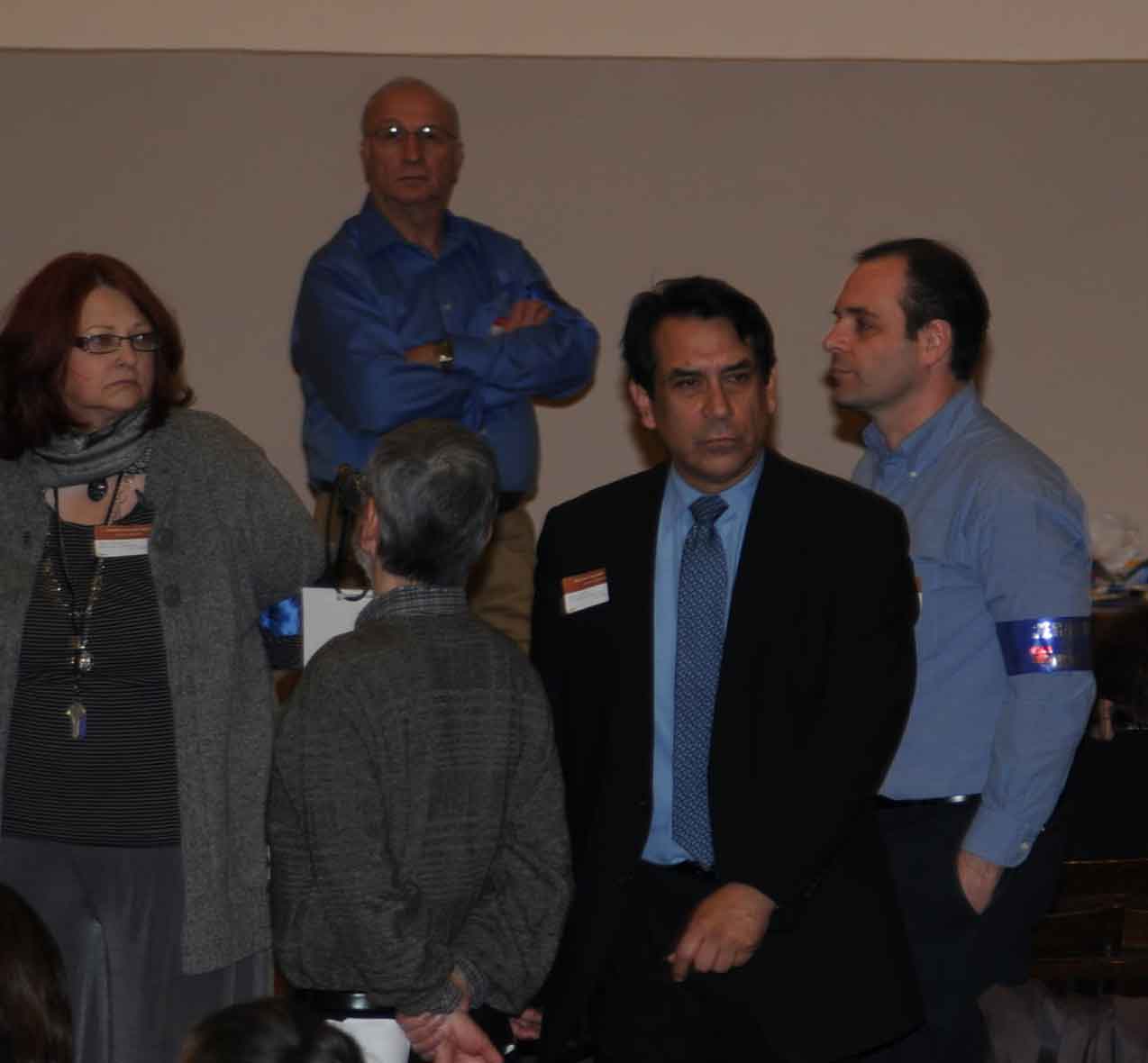 The tight control of the House of Delegates meeting was evident everywhere. When retiree delegate Louis Pyster (above, with back to camera) tried to ask that the May 2009 meeting present a budget that itemized the officers' pay and benefits, the meeting was abruptly ended with a quorum call. Above, typical of the way Marilyn Stewart operates, three "sergeants at arms" surround Pyster during the meeting. Facing the camera is CTU financial secretary Mark Ochoa, who asked Substance not to take photographs during the meeting. Substance photo by George N. Schmidt.Retiree delegate Lou Pyster reminded the delegates that he brought this up, and it was never reported on. The procedure for the union's budget is that it is presented at the May meeting and then debated for approval at the June meeting. In the middle of Pyster's demand that the budget itemize the pay and benefits of the union officers and all union staff, there was a call for quorum from the floor.
The tight control of the House of Delegates meeting was evident everywhere. When retiree delegate Louis Pyster (above, with back to camera) tried to ask that the May 2009 meeting present a budget that itemized the officers' pay and benefits, the meeting was abruptly ended with a quorum call. Above, typical of the way Marilyn Stewart operates, three "sergeants at arms" surround Pyster during the meeting. Facing the camera is CTU financial secretary Mark Ochoa, who asked Substance not to take photographs during the meeting. Substance photo by George N. Schmidt.Retiree delegate Lou Pyster reminded the delegates that he brought this up, and it was never reported on. The procedure for the union's budget is that it is presented at the May meeting and then debated for approval at the June meeting. In the middle of Pyster's demand that the budget itemize the pay and benefits of the union officers and all union staff, there was a call for quorum from the floor.
Marilyn Stewart ruled that the quorum called during the discussion of his motion and was in order.
“What are you afraid of?” Pyster asked.
Marilyn Stewart said that a quorum is 217.
Ray Wohl (Thurgood Marshall Middle) interrupted: "All calls must be from the microphone. Who called for quorum?" Point of Order Debby L.-CTU constitution says if amendment, 10% of membership, what is your procedure to filing with recording secretary. Marilyn: You have a petition.
Stewart announced that the number of delegates left in the House is 155. "We don’t have a quorum," she said. As some delegates tried to speak, Stewart said: "The meeting is adjorned. We don’t have a quorum."
The final edited version of this article was posted to www.substancenews.net on April 19, 2009. Anyone wishing to reprint it, in whole or in part, or to use any of the photographs accompanying the article is asked to attribute to Substance as follows: "Copyright 2009 Substance, Inc. Web site at www.substancenews.net, all rights reserved. If you utilize this material, please credit Substance and contact Substance by phone (773-725-7502) or Email (Csubstance@ aol.com).


By: Jim Vail
teacher/reporter
Great delegate story! So we have the AFT president state how great it is that Obama was elected president, and then state it is his goal to lift the cap on charter schools, which essentially spells the end of the Chicago Teachers Union. It is up to us the teachers to see the leadership selling us out and fight - something that CORE - the Caucus of Rank and File Teachers - has started to do!